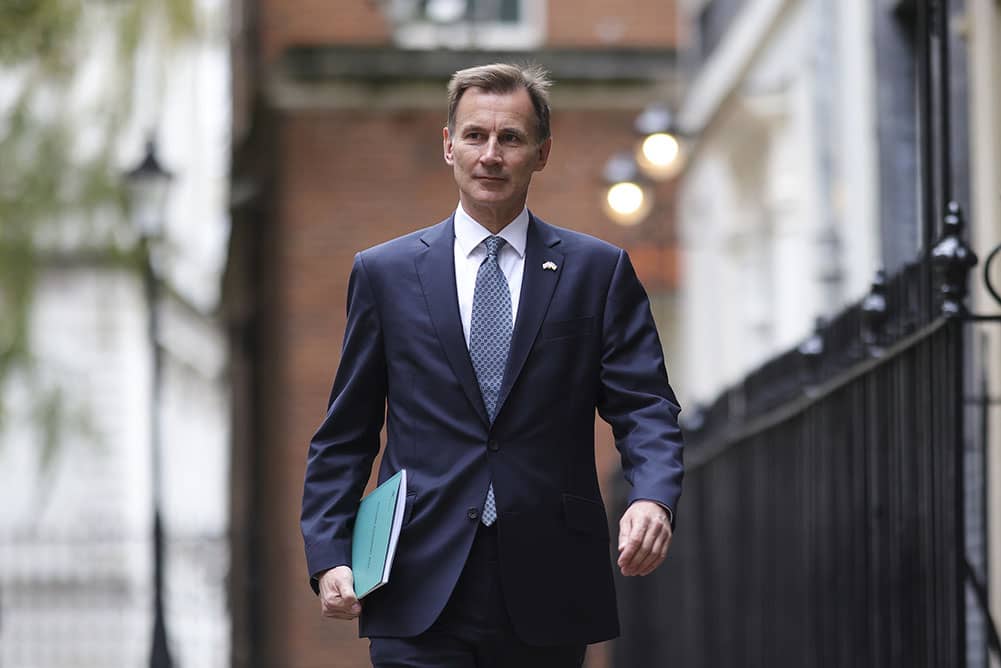Pound Sterling Budget Reaction: Cautious Approval
- Written by: Gary Howes
-

Above: The Chancellor of the Exchequer Jeremy Hunt leaves 11 Downing Street to deliver his Autumn Statement to parliament. Source: Gov.Uk.
The British Pound was lower after the UK government announced in its Autumn Statement it would introduce new tax hikes and spending cuts that economists warn would risk further slowing the UK's already stuttering economy.
Chancellor Jeremy Hunt told Parliament his spending and tax plans would mean the Government would hit its target of consolidating the country's finances to the tune of £55BN; as a result, UK interest rates were to end up "significantly lower".
Hunt said his aim was to bring the proportion of debt relative to growth down over a five-year horizon as he attempted to reassure markets the government had rediscovered sound fiscal management.
The consolidation would be split evenly between tax hikes and spending savings.
"Markets seem to be slightly reassured by today’s statement despite a variety of policies that may prove to be unpopular, but one thing is clear, the economic backdrop remains negative, at least for the short term with the economy in a recession and a variety of new policies which could impact incomes across the board," says Walid Koudmani, Chief Market Analyst at online investment platform XTB.com.
Hunt sought to restore market confidence in the UK government following the volatility sparked by his predecessor's 'mini budget' of September, and as noted in Pound Sterling Live's preview, this would be important for the Pound.
He appears to have convinced markets he has a credible plan as gilt yields are steady near their lowest levels since September 20, meaning they remain near where they were prior to Liz Truss' ill-fated budget.
"There were few surprises – a strict, ‘kitchen sink’ budget had already been priced into the GBP, and bond markets tend to like austerity because it is disinflationary," says Giles Coghlan, Chief Market Analyst at HYCM.
Despite the government's return to fiscal credibility, the fundamental outlook for the UK economy, and therefore the Pound, is challenging over the longer term as the government is hiking taxes and reducing spending heading into a recession, meaning it potentially risks making a bad situation worse.
"Looming deep recession. Years of austerity & weak investment. High twin deficit that needs funding. Housing market on a knife-edge. Apart from a short squeeze - which looks over now - there’s no good reason to hold an overweight position in the pound right now," says Viraj Patel, an analyst at Vanda Research.
The Pound to Euro exchange rate is down a third of a percent on the day at 1.1433, the Pound to Dollar exchange rate is down a percent at 1.1800. Note that the GBP/EUR offers the better signal as the Dollar is up right across the board, (EUR/USD is down two-thirds of a percent on the day).
(It must be stressed that global stock markets are deep in the red on Thursday, which is typically unfavourable for the Pound. Therefore it is difficult to get a clear signal from the market. Nevertheless, if you are looking to protect or boost your international payment budget you could consider securing today's rate for use in the future, or set an order for your ideal rate when it is achieved, more information can be found here.)
The Office for Budget Responsibility's latest economic forecasts, released alongside the Autumn Statement, confirm a recession and rise in unemployment lies ahead.
The forecasts informed the Chancellor's decisions and revealed the squeeze on real incomes, rise in interest rates, and fall in house prices all weigh on consumption and investment over coming years.
This would send the economy into a recession lasting just over a year from the third quarter of 2022, with a peak-to-trough fall in GDP of 2%.
Unemployment is forecast to rise by 505,000 from 3.5% to a peak of 4.9% in the third quarter of 2024.
Looking at the details of Hunt's announcements, we see the following:
Tax Hikes
- Personal tax thresholds will be maintained at current levels for a further 2 years, until April 2028 to strengthen public finances.
"The Chancellor has announced an effective tax rise for all by freezing thresholds on personal incomes taxes. Given that the latest ONS data indicates that real wages fell by 2.6 per cent on the year, we had hoped the Chancellor would not implement this policy in the lower thresholds – as it will further squeeze budgets that are already at capacity due to the cost-of-living crisis," says Paula Bejarano Carbo, Associate Economist at the NIESR.
- Tax-free allowance for capital gains will reduce in 2023-24 from £12,300 to 6,000 and again to 3,000 in 2024-25.
- The tax-free dividend allowance will be reduced to £1,000 in 2023-24, and then to £500 in 2024-25
"Entrepreneurs are being penalised with the increase in taxes on both capital gains and dividends, and those people who have diligently invested over the long term to build up their financial resilience will no doubt feel unfairly swiped by this grab from profits," says Susannah Streeter, senior investment and markets analyst at Hargreaves Lansdown.
- From April 2023 the rate at which people pay the additional rate of income tax, charged at 45%, will change from £150k to those earning over £125,140.
- The Energy Profits Levy is being increased from 25% to 35% & will be extended
- A new temporary 45% levy on electricity generators is introduced
- From 2025, road tax will be introduced for electric vehicles
- Stamp Duty cuts announced in the Growth Plan will now be time-limited, ending on 31 March 2025
Spending Cuts
There are no cuts, instead, the Government will make savings by continuing to increase spending in real terms every year for the next 5 years, but at a slower rate.
Headlines here include the budget for schools increasing by £2.3BN next year & £2.3BN the year after, taking the core schools budget to a total of £58.8BN.
Hunt also announced no cuts would be made to the UK's planned infrastructure projects, these include the progression of the Sizewell C nuclear power station, HS2 rail and other rail projects located in the north of the country.
The government also announced post-Brexit reforms of Solvency II, which is expected to unlock tens of billions of pounds in investment by UK insurance companies. "The reforms will also slash red tape left over from the EU & maintain high standards of customer protection," said Hunt.
The Pensions Triple Lock and Pension Credit will be protected and rise in April 2023 by 10.1%.
Working age benefits will rise by the rate of inflation at 10.1% and the household benefit cap to be increased from April 2023. The Treasury estimates this will cost the government £11BN.
The NHS would meanwhile see an additional £3.3BN come its way.

